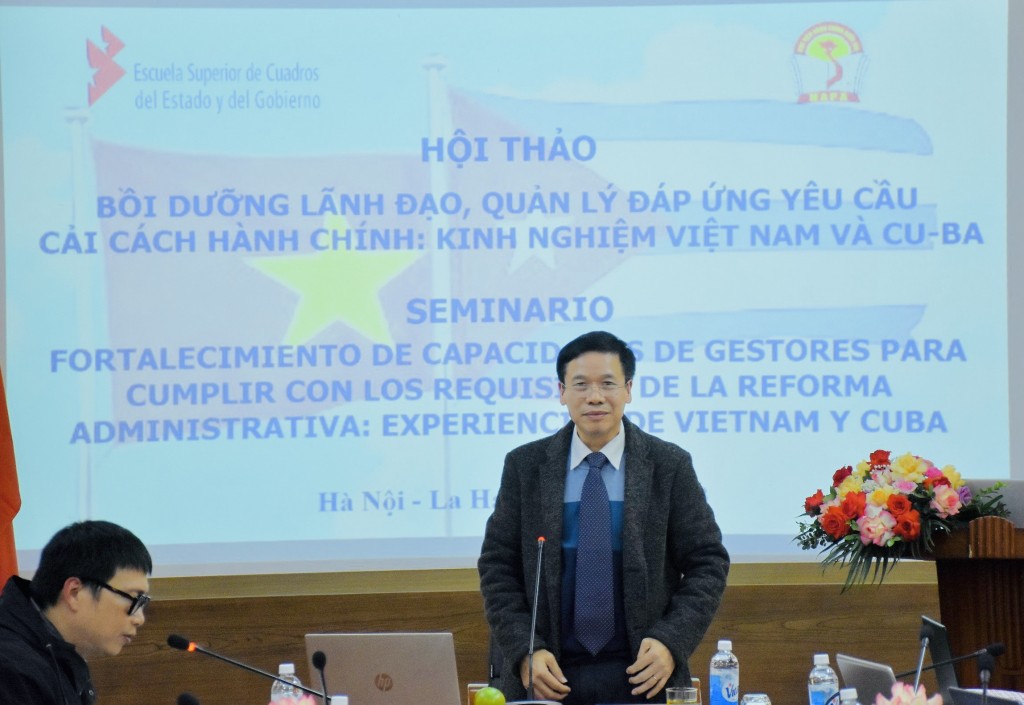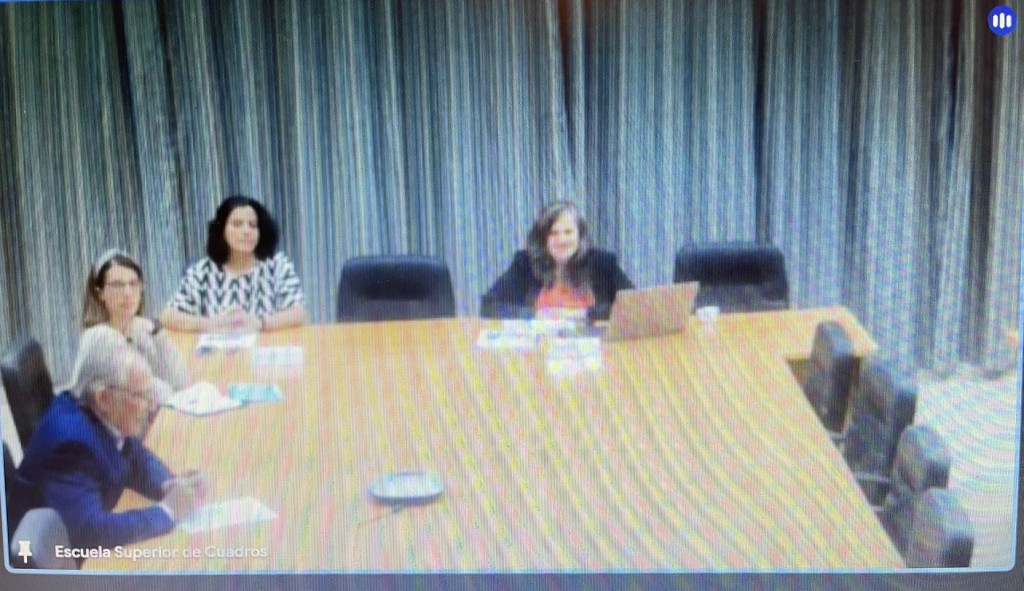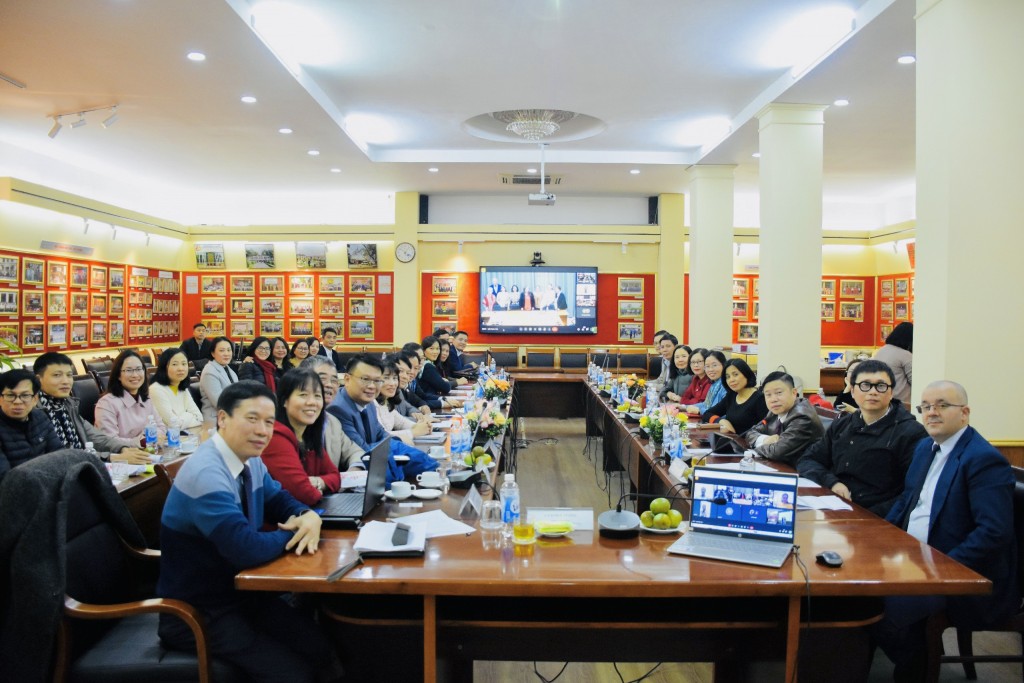On December 21, the National Academy of Public Administration (NAPA) and the Higher School of State and Government (Spanish: Escuela Superior de Cuadros del Estado y del Gobierno – ESCEG) of Cuba co-organize an International Workshop titled “Leadership and management training to meet administrative reform requirements: Experiences of Viet Nam and Cuba “. The Workshop was held in a hybrid format with in-person participation in NAPA Headquarters in Ha Noi and virtual attendance of Cuba and NAPA Branch campuses in Ho Chi Minh City, Tay Nguyen, and Central Region.
Virtually attending the Workshop from Cuba were Prof. Dr. Mercedes Delgado Fernández, ESCEG Rector of Cuba; Prof. Ana Gloria Navarro Pentón, ESCEG Vice Rector and ESCEG staff and lecturers.
Mr. Joy Puentes Saldise, Deputy Head of Mission, Embassy of the Republic of Cuba in Viet Nam and Dr. Dinh Duy Hoa, Former Director General of the Department of Administrative Reforms, Ministry of Home Affairs attended the Workshop in-person.
On the side of NAPA, Dr. Lai Duc Vuong, NAPA Vice President, chaired the Workshop. Representatives of NAPA units, speakers and academics were also in attendance.
In his opening remarks of the Workshop, Dr. Lai Duc Vuong, on behalf of the NAPA leaders and staff, expressed sincere thanks and a warm welcome to the leaders and representatives of the Embassy of Cuba in Viet Nam, delegates, and academics from Cuba and Viet Nam attended the Workshop jointly organized by NAPA of Viet Nam and ESCEG of Cuba.
For NAPA, strengthening and developing cooperation with the ESCEG of Cuba in leadership and management training is one of the top priorities. This contributes to the promotion of cooperative relations between the two countries. Since 2020, both sides have annually organized international workshops to share experiences in training for public servants, especially for public leaders and managers.
Based on the scientific and practical requirements exchanged and discussed between the two sides, NAPA and ESCEG have agreed to coordinate the Workshop. The Workshop is an opportunity for Vietnamese and Cuban experts, scientists, and managers to exchange and clarify the context of administrative reform and the requirements placed on public leaders and managers. It aims to explore Viet Nam’s and Cuba’s experiences in innovating the training of public leaders and managers to meet administrative reform requirements, thereby drawing lessons and good practices that can be applied in each country.
With many years of experience in innovating training to meet the requirements of administrative reform and national innovation, NAPA is ready to share its valuable experiences with ESCEG. At the same time, NAPA is very eager to learn valuable experiences from the ESCEG to contribute to the quality improvement in training for public leaders and managers and to accompany Cuba in developing and building the foundation for a prosperous and happy society in each country.
Viet Nam’s and Cuba’s experiences in leadership and management training to meet administrative reform requirements
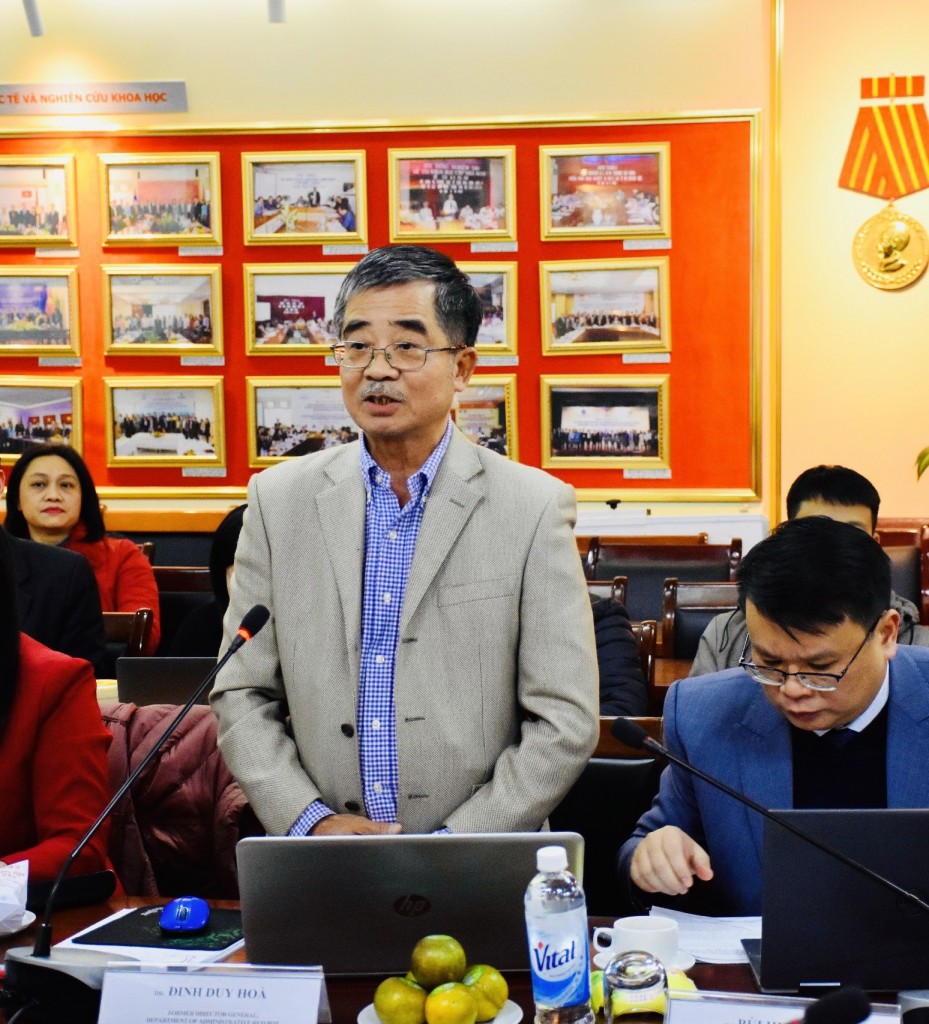
Dr. Dinh Duy Hoa, Former Director General of the Department of Administrative Reforms, Ministry of Home Affairs delivering his presentation.
With his presentation titled “Administrative reform and requirements for leadership and management training in Viet Nam”, Dr. Dinh Duy Hoa gave four main points of the presentation: (1) Why Viet Nam needs administrative reform; (2) The administrative reform process in Viet Nam; (3) The comprehensive program of state administrative reform for the 2021 – 2030 period; (4) Requirements for leadership and management training.
Dr. Dinh Duy Hoa affirmed that improving the quality of public servants is one of the specific goals of administrative reform, in which public leaders and managers play an important role in public service activities. Therefore, improving the quality of public leaders and managers through training is extremely necessary. Through training, there will be a transformation in the mindset regarding the role and functions of the State and administrative agencies in a market economy. It aims to enhance the capacity to establish institutions and formulate policies among public leaders and managers.
In the presentation on “Experience in training public leaders and managers in Cuba”, Prof. Mercedes Delgado Fernández, ESCEG Rector of Cuba, stated that in Cuba, Law 13 of 2020 and Decree 208 of 2021 of the President on the employment system for state officials and reserve forces were issued. These regulate that officials, before assuming a managerial position, must be reserve officials and undergo preparatory activities. Besides comprehensive preparation to assume a new position, they must equip themselves with knowledge and skills and strictly adhere to legal procedures and regulations to ensure leadership and management capabilities. The comprehensive preparation for officials before taking on leadership positions is supported by the ESCEG through the National Socio-Economic Development Plan until 2030, following the guidelines for building economic and social development policies (every five years). Accordingly, Cuba’s personnel policy is strictly regulated through the legislative process according to Cuba’s new Constitution, suitable for domestic and international development contexts. Similarly, the comprehensive preparation for these officials aims to help them absorb general management skills and specific skills in public administration and business management, depending on the job positions assigned to each official. To acquire these skills and innovative management methods, the ESCEG of Cuba will design and confirm a program for official training to ensure that the program runs smoothly or will continue to be improved and approved for implementation by the School’s leadership. The approved method includes stages such as preparation, introducing innovation concepts to design and implement regulations on policy planning as well as creating and implementing innovations in products, services, processes, and organizational activities.
In addition, other points of the training process at ESCEG involve the collaboration of public administration managers and experts in business management activities from localities and industries who will provide teaching to participants and students through seminar programs, including exchange seminars, multi-dimensional simulation integration seminars, online teaching (especially during the Covid-19 pandemic), interspersed with practical field trips. This systematic approach will promote the exchange and learning between lecturers and students.
The training process for cadres, participants, and students of ESCEG has achieved certain successes. For example, in the 12 years since the establishment of ESCEG, more than 14,000 managers have graduated through various forms of training. There are 259 people from 7 postgraduate training courses specializing in public administration; 1,815 State and Government officials who have graduated from 26 courses (with 3 different degree programs with a training period lasting from 10 – 12 weeks). ESCEG is also responsible for providing methodological advice to 27 domestic authorized agencies in improving staff capacity in the field of public administration and business management.
She emphasized that training managers with a comprehensive, strategic approach and a focus on innovation, as ESCEG is currently working on and aiming for, will create conditions for a change in mindset to achieve a public and business administration that serves the people with transparency, agility, effectiveness and efficiency, contributing to the implementation of goals and tasks of building institutions and policies towards the National Socio-Economic Development Plan until 2030 and the sustainable development and prosperity of socialism in Cuba in the future.
Reflections and implications for both training institutions:
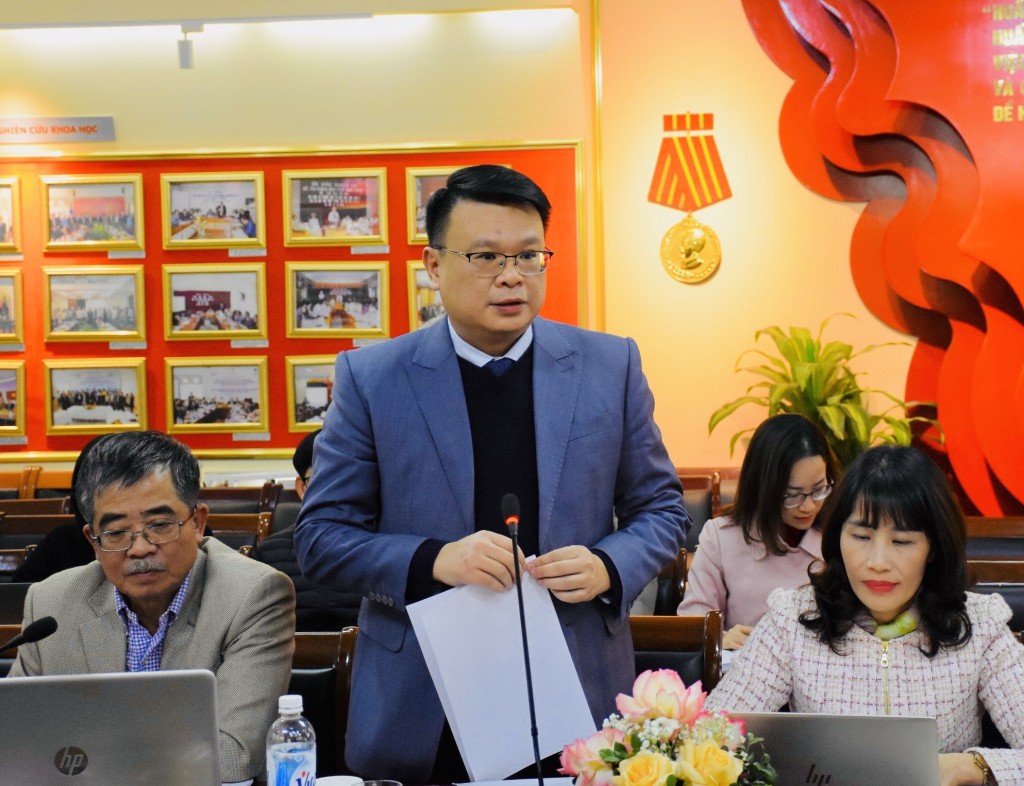
Dr. Bui Huy Tung, Director, Department of Refresher Training Management, NAPA, delivering his presentation.
With his presentation on “Innovating leadership and management training activities to meet administrative reform requirements in Viet Nam”, Dr. Bui Huy Tung stated that international integration is strongly influencing all aspects of socio-economic life, requiring countries to constantly innovate, improve competitiveness capacity, strengthen cooperation, share experiences, learn from each other, and contribute to the development of all aspects of socio-economic life. In addition, the Fourth Industrial Revolution requires countries to rapidly transform digitally to innovate the operation methods of the administrative apparatus towards professionalism, efficiency, and streamline administrative procedures, improve the quality of public services, and enhance transparency and accountability in the performance of public duties by public servants, especially public leaders and managers of sectors and levels.
For public leaders and managers, the trend requires them to be equipped and updated with new knowledge about the Fourth Industrial Revolution, digital transformation, national governance, international integration, digital technology, foreign languages, knowledge and skills according to their job positions, and skills to work in an international environment. At the same time, it also creates pressure for NAPA, in the process of training and updating knowledge and skills for public leaders and managers of industries and levels, to always maximize internal resources and access to the strategies and training plans of advanced countries, absorb new knowledge and skills in a timely manner, serving the diverse needs of learners and the requirements of state administrative reform in each period. s
Dr. Bui Huy Tung also proposed nine solutions to promote leadership and management training activities in the coming time at NAPA:
Firstly, ensuring unity and consistency in thinking, awareness, determination, responsibility and motivation for innovation and creativity, increasing access and application of international knowledge, experience and modern technology; determining the overall implementation of the digital transformation project, the overall administrative reform program, accelerating the application of experiences, the process of digitizing lectures, documents, learning materials and improving digital library; digitizing information and management processes to support management and decision making, building digital people capable of using multiple languages; quickly completing the digital platform for training; ensuring development and meeting the requirements set out in the new period.
Secondly, continuing to build and complete training programs and materials in the direction of providing knowledge for integration and administrative reform, based on the characteristics and requirements of each job position, each region, and each target group of learners; developing plans and training programs suitable for public servants, public leaders and managers, focusing on combining theory and practice in the direction of enhancing practical elements; applying advanced methods and techniques to develop programs and documents through consulting and absorbing knowledge, programs, and learning materials at home and abroad; organizing international conferences, inviting reputable domestic and foreign experts to participate in building and evaluating training programs and materials…
Thirdly, increasing the use of active teaching methods, combining various different teaching methods appropriate to the content of the lesson, the target learners, and teaching goals, and creating excitement, initiative, and active learning for learners.
Fourthly, promoting the diversification of training forms based on the application of digital technology; deploying new training models based on digital platforms; innovating from organizational methods to evaluating results and effectiveness of training according to the comprehensive administrative reform program outlined by the Government.
Fifthly, strengthening academic research, creating conditions for lecturers to do research through financial support, equipment, and time; learning from the experiences of advanced countries in diversifying research to improve teaching quality; providing opportunities for lecturers to participate in domestic and international seminars and conferences, thereby updating new knowledge and skills in research and applying scientific research results to teaching, serving administrative reform.
Sixthly, strengthening international cooperation in the field of training, promptly absorbing advanced training experiences from countries around the world. Continuing to build and improve the quality of a team of domestic and foreign lecturers, reporters, and experts with a deep understanding of knowledge and skills about national governance, state administration, and understanding of international administrative systems, strengthening cooperation in research, updating professional teaching skills, useful practical experience at home and abroad, and the ability to work in a digital environment.
Seventhly, increasing the invitation of current leaders, managers, experts, scientists, and individuals with experience and capacity from state management agencies, training, and research institutions, both domestically and internationally, to participate in training activities, update new knowledge and skills according to job position requirements, creating favorable conditions for their coordination, contribution, and dedication, contributing to the improvement in training quality.
Eighthly, strengthening management, supervision, and evaluation of the quality of leadership and management training.
Ninthly, enhancing the application of information technology in training, gradually expanding the scale and scope of providing training services, meeting the learning needs of learners everywhere, anytime, and meeting the requirements of learners and management agencies.
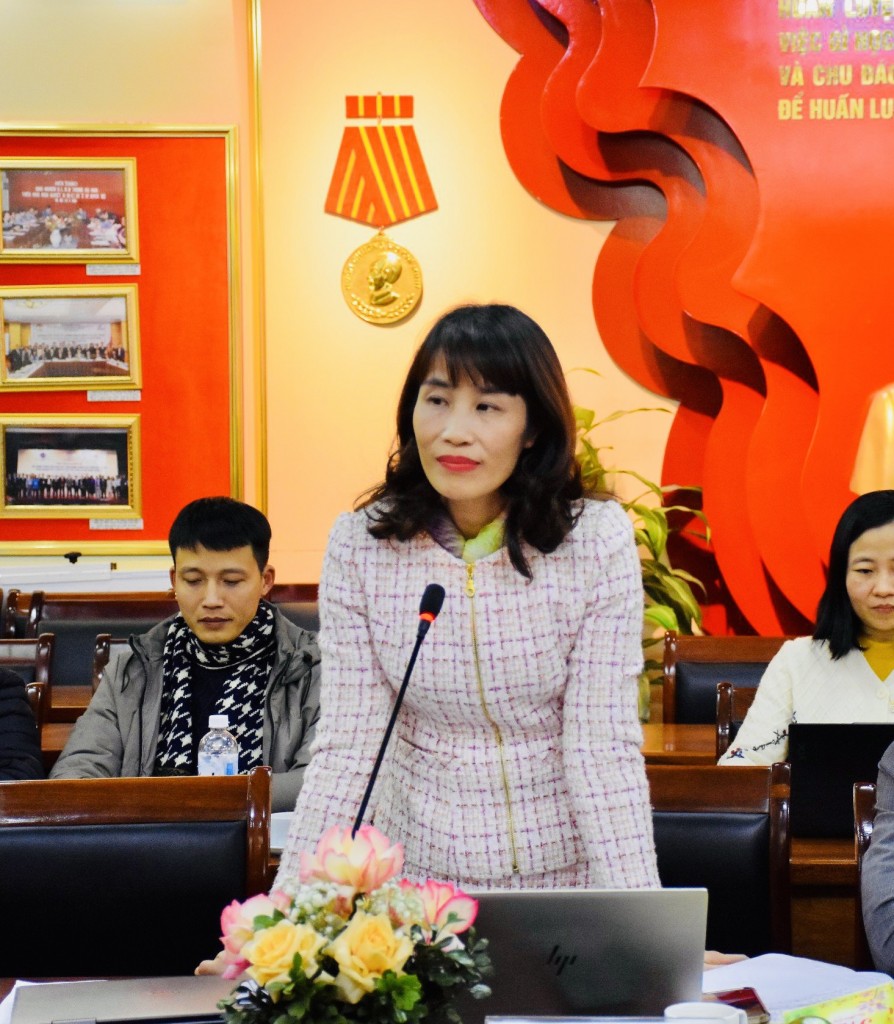
Assoc. Prof. Dr. Hoang Mai, Dean, Faculty of Human Resource Management, NAPA, presenting at the Workshop.
Assoc.Prof.Dr. Hoang Mai delivered a presentation at the Workshop with the topic “Training public leaders and managers to meet the requirements of building a digital government in Viet Nam”.
The presentation focused on three main issues: (1) The capacity of public leaders and managers to meet the requirements of building a digital government; (2) The current status of training public leaders and managers in response to the requirements of building a digital government; (3) Innovation in training public leaders and managers to meet the requirements of building a digital government.
During her presentation, Assoc.Prof. Dr. Hoang Mai has raised the digital government’s requirements for training public leaders and managers; factors affecting the training of public leaders and managers to meet the demands of building a digital government.
Based on the current situation of training public leaders and managers in Viet Nam, Assoc.Prof. Dr. Hoang Mai proposed 6 innovative training solutions, including (1) building a digital competency framework; (2) improving the training institutions; (3) innovating the training program; (4) enhancing the capacity of training institutions; (5) ensuring training resources; (6) strengthening international cooperation in training.
In his closing remarks for the Workshop, Dr. Lai Duc Vuong, on behalf of NAPA, expressed his sincere thanks to the Cuban Embassy in Viet Nam, the Board of Directors, officers and lecturers of ESCEG and the Cuban Government for their collaboration with NAPA in organizing the Workshop. Dr. Lai Duc Vuong sent his thanks to the Cuban and Vietnamese scholars and experts who, despite the differences in space and time, actively participated and presented at the Workshop.


